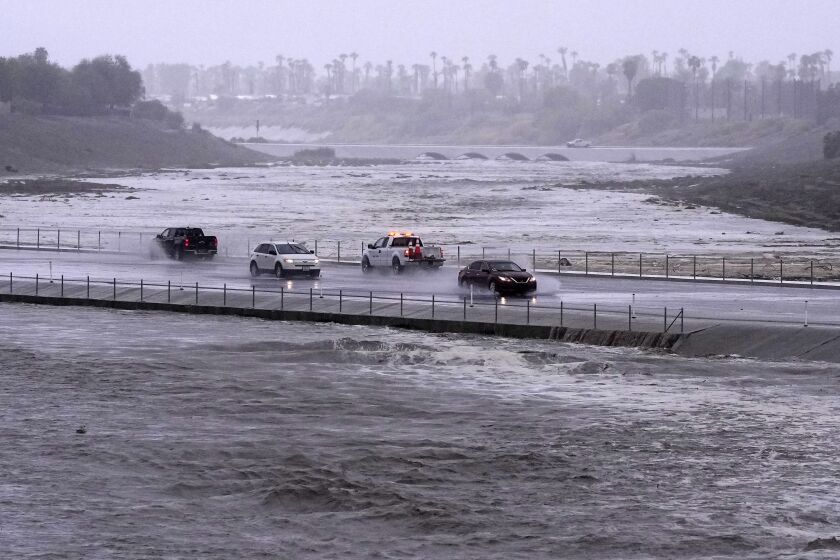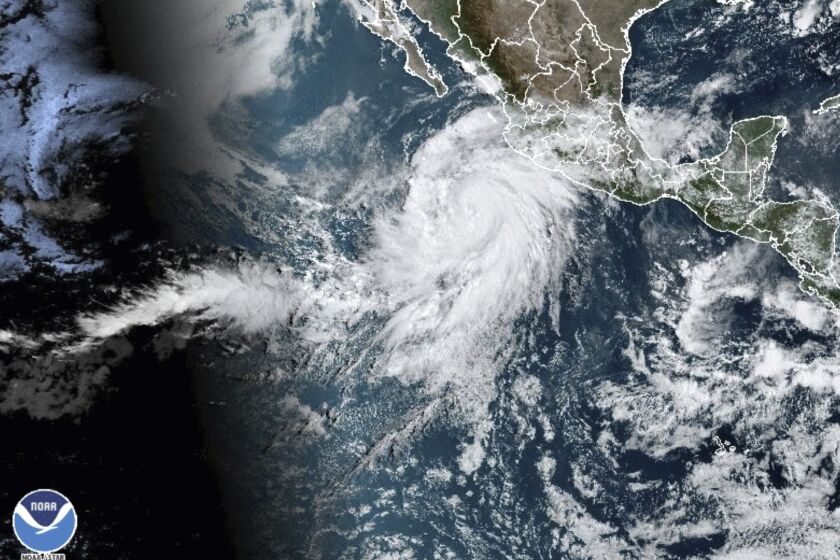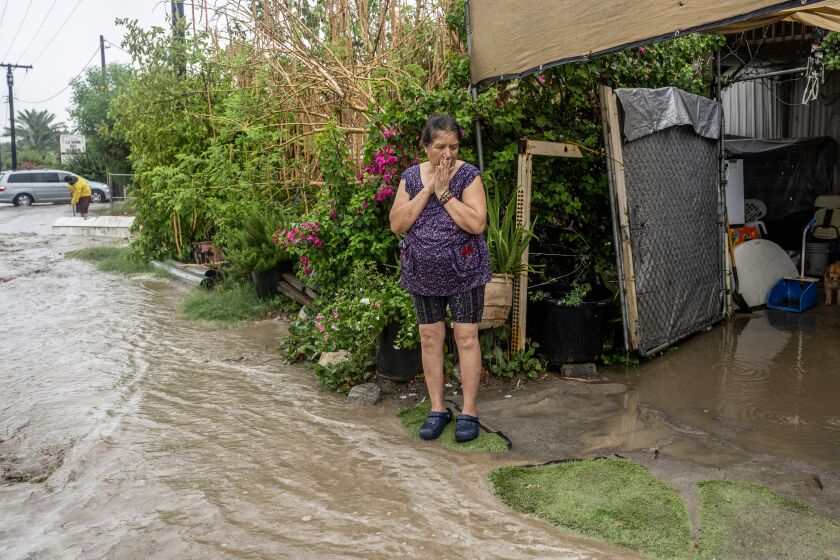
In the wake of Hilary’s lashing of Southern California, the region awoke Monday to lingering damage from the historic storm, with debris flows and flash floods washing out or burying roadways in parts of San Bernardino and Riverside counties and leaving firefighters, residents and motorists stranded.
At San Bernardino County Fire Station 99 in Forest Falls, a small, unincorporated community near the El Dorado burn scar, the rain transformed a wooded, rocky area into a roaring mudslide, forcing firefighters to run for safety.
According to video from OnScene, fire crews were inside the station when they heard rumbling. They hiked up a small hill, where brown water quickly swelled into a wave of rocks, downed tree trunks and other debris that rushed down the hillside and onto the roadway. Firefighters reported that access to the station was blocked in both directions, according to OnScene.
“It will take some time to uncover that debris and check the road surface,” Sherwin said. About 700 residents are sheltered in place, but no injuries or major structural damage had been reported, he said.
Firefighters in the San Bernardino County mountains also were working to access stranded residents in Seven Oaks, where officials expected flooding to have destroyed several homes and high water prompted some rescues, Sherwin said. One injury that was not determined to be life-threatening was reported, he said.
In Oak Glen, farther south in San Bernardino National Forest, numerous debris flows and downed power lines had damaged at least two bridges, Sherwin said.
Under its first-ever tropical storm warning, Southern California received record rainfall that turned streets into muddy, debris-swollen rivers, downed trees and knocked out power for thousands of residents, and closed schools across the Southland.
During a morning update at the city’s Emergency Operations Center, Mayor Karen Bass said no fatalities or major injuries were reported in Los Angeles in connection with the storm.
Crews from L.A. city agencies were responding to downed power lines, toppled trees, damaged streets and clogged storm drains, Bass said. About 18,000 customers of the Los Angeles Department of Water and Power were without power Monday, including residents of Hollywood, Pico-Union and Beverly Grove, according to Marty Adams, the top executive of the city’s utility.
The Los Angeles Fire Department received reports of 22 minor mud flows and at least 459 tree-related issues, according to Capt. Erik Scott.
Hilary has now been downgraded to a post-tropical storm, the National Hurricane Center said. But even in its weakened state, it was still predicted to bring “catastrophic and life-threatening flooding” to parts of the southwestern U.S., the center said.
The center of the storm was over Nevada early Monday. But forecasters warned Southern California residents to brace for more rainfall, including a chance of thunderstorms, as well as strong winds, with gusts of up to 50 mph possible at higher elevations.
Federal disaster officials found themselves responding to dual Pacific catastrophes Monday. President Biden headed to Hawaii to inspect wildfire damage in Maui with Federal Emergency Management Agency Administrator Deanne Criswell, who was simultaneously monitoring Hilary from Air Force One.
FEMA officials announced Monday that the agency had sent two teams to California to manage the federal response and would keep more officials on standby if needed.
Hilary broke “virtually all rainfall daily records” for Sunday, according to the National Weather Service in Oxnard. Among the more impressive totals were in Lewis Ranch, which recorded 7.04 inches of rain; Lake Palmdale, which reported 5.98 inches; UCLA, with 4.26 inches; Thousand Oaks, with 3.29 inches; and downtown Los Angeles, with 2.38 inches.
Rose Schoenfeld, a meteorologist with the weather service in Oxnard, said the biggest impact from Hilary was flash flooding throughout the region, with significant flooding in the Antelope Valley and parts of L.A. County and Ventura County.
On Sunday, Highway 138 in the Antelope Valley was closed by running water and debris flows.
Flooding on the 5 Freeway in Sun Valley severely limited access to northbound lanes early Monday. Only two lanes of the five-lane highway were open at Lankershim Boulevard because of flooding and mud debris, according to the California Department of Transportation.
Outside L.A., about 20,000 customers were without power in Southern California on Monday morning, according to Southern California Edison’s website. SCE President and Chief Executive Steve Powell told CNN that crews have been dispatched to restore electricity in affected areas.
Southern California deserts — which also saw unprecedented rainfall — faced some of the worst storm destruction, with roadways flooded and communities marooned in the Coachella Valley.
Riverside County declared a local emergency in the wake of Hilary that officials deemed would last at least a week as cleanup efforts get underway.
Early Monday, Palm Springs officials warned that 911 lines were down. Residents were advised to text 911.
An eastbound section of the 10 Freeway in Riverside County near Indio remained closed “until further notice,” officials said early Monday.
Hilary first made landfall Sunday on Mexico’s Baja California peninsula, where soldiers fanned out across the state to remove road hazards and rescue people from floodwaters, officials said. Schools were closed Monday, though by daybreak in Tijuana, the rain had stopped and many roads, which had been washed out by rock slides and debris, were dry.
Officials in Tijuana said late Sunday there were no major incidents stemming from the storm, and only a couple dozen traffic accidents and one stuck vehicle.
Times staff writers Louis Sahagún, Brittny Mejia, Noah Bierman, Keri Blakinger, Connor Sheets and Richard Winton contributed to this report.
Source: LA Times


